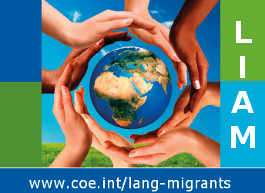Surveys
To date the Council of Europe has carried out 4 surveys among its member states on policy and practice relating to the linguistic integration of adult migrants.
The aim is to identify emerging policy trends in member states and to stimulate reflection and debate on language requirements and language course provision in the light of shared principles. It is not to evaluate policy or its implementation in specific contexts.
Each survey was followed by an intergovernmental conference during which results and findings were officially reported.
Survey 2018
2018 Survey on Language Policies and Language Requirements for Migrants in the Member States.
The primary purpose of this survey, organised in cooperation with the Association of Language Testers in Europe (ALTE), is to map the language requirements and knowledge of society (KoS) requirements for migrants in Council of Europe member states prior to entry, for residence and for citizenship with the aim of identifying trends in policies for the linguistic integration of migrants. A new feature in this survey is the particular attention dedicated to vulnerable groups, such as illiterate/low-literate migrants, women, unaccompanied minors, asylum seekers and refugees.
The report “Linguistic Integration of Adult Migrants: Requirements and Learning opportunities” presents the results of the survey, providing insights into the trends in the migration policies in Council of Europe member states in the last decade, discussions on the implications of increasing use of language and KoS requirements with a distinct focus on vulnerable groups and recommends measures to be taken by policy makers and professionals in the field.
Survey 2013
The 3rd survey was organised by the Language Policy Unit under the auspices of the Steering Committee for Educational Policy and Practice (CDPPE)
With 42 states having taken part in at least one of the three surveys conducted since 2007 the results of this 3rd Council of Europe survey are representative of the situation in its 47 member states. 36 Council of Europe member states participated in this 3rd survey.
- Report on the 3rd Council of Europe Survey
- Questionnaire of the online survey 2013
A unique feature of the survey report is the analysis, to the extent that the data permits, of key developments in language policy over the period of the three surveys undertaken between 2007 and 2013.
As for previous surveys, main results and trends were presented during the 3rd intergovernmental conference organised in Strasbourg in June 2014:
- Reinhilde Pulinx
- Claire Extramiana (in French only)
Chapter 3 of the Conference report provides a detailed summary of these presentations.
Survey 2009/2010
The second survey was again co-organised by the Language Policy Division and the Migration Division under the aegis of the European Committee on Migration (CDMG). 31 Council of Europe member states participated in this 2nd survey.
Feedback on results and main trends trends were:
- published in the Report : Language requirements for adult migrants in Council of Europe member states: Report on a survey
- reported during the intergovernmental conference held in June 2010 in Strasbourg:
- Claire Extramiana: Powerpoint Presentation and accompanying text (in French only)
- Piet van Avermaet: Powerpoint Presentation
Survey 2007/2008
This first survey was co-organised by the Language Policy Division (now Unit) and the Migration Division in co-operation with the Association of Language Testers in Europe (ALTE, www.alte.org) which had organised a similar survey in 2002, and with DGLFLF (Délégation à la langue française et aux langues de France). 26 Council of Europe member states participated in this first survey.
Feedback on results and trends were presented during the 1st intergovernmental seminar organised in June 2008 in Strasbourg:
- Claire Extramiana : Powerpoint Presentation and accompanying text (in French only)
- Piet van Avermaet : Powerpoint Presentation and accompanying text
The 2008 Seminar Report provides a detailed feedback on results (see Chapter 2).




